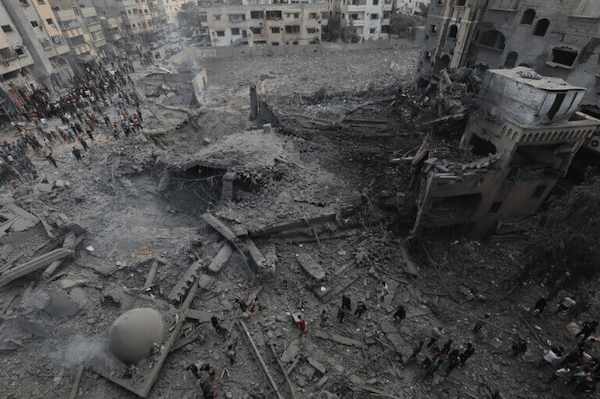Today is the 75th anniversary of the Universal Declaration of Human Rights. Adopted out of the scars of the Second World War, the UDHR outlined 30 inalienable rights and freedoms that belong to us all, regardless of sex, gender, sexual orientation, race, ethnicity, creed, language, religion or background. Rights to life, liberty and privacy. Freedom of expression, assembly and movement. Freedom from torture, arbitrary arrest or exile. Rights to social security, education, equal pay and a decent standard of living, including food, clothing, housing, and medical care. The right to seek asylum.
The magnitude of this achievement should not be underestimated. This document, for the first time, enshrined the fundamental human rights of individuals everywhere. Since then, it has served as a foundation for human rights campaigners to defend the dignity and equality of people across the globe.
Today, however, is not a time for celebration. It is a time for reflection.
75 years on from this landmark document, millions of people are still denied the fundamental rights and freedoms it was meant to enshrine. Right now, 700 million people are living in extreme poverty, subsisting on less than $2.15 a day. Two-thirds are children. In 2022, more than 238,000 people were killed in conflict–that’s the highest death toll since the beginning of the century. Refugees—fleeing war, persecution, human rights abuses and climate catastrophe—are drowning at sea.
These grotesque levels of poverty, violence and desperation are not the fault or failure of the UDHR. They are the fault and failure of governments who give lip service to a document whose founding principles they continue to desecrate.
On Monday, MPs will mark the UDHR’s anniversary by gathering for a candlelight vigil, under the title ‘Parliamentarians for Peace.’ How ironic that the majority have given the green light to some of the most appalling levels of death and destruction we have witnessed in decades.
Over the past two months, 1,200 people in Israel and 17,700 people in Gaza have been killed. 1.8 million people in Gaza have been displaced. Half of all housing units have been destroyed. More people could die from disease than from bombings if the health system is not restored. Last month, Parliament voted on the call for a ceasefire. MPs faced a simple moral choice: do you support the indiscriminate killing of human beings, or do you want to stop the further loss of human life? Shamefully, the majority of MPs voted against a ceasefire. Today, people in Gaza are living with the consequences.
Do Palestinians not qualify for the inalienable right to life that the UDHR enshrines? Do Palestinian children not deserve to laugh and play with their friends at school too? People in Gaza are paying the price for a horrific crime they did not commit. It is a form of collective punishment that stands in direct contradiction to the UDHR’s central mantra: that human beings should not be discriminated against on the basis of their ethnicity or background. The UDHR is being buried under the rubble, along with the human beings whose rights this document was written to protect.
Across the board, our political representatives are showing monstrous hypocrisy in their commitment to a document they show no signs of respecting. As we speak, our government is attempting to circumvent international law in order to implement its assault on the rights of refugees. And they are emboldened by an opposition front bench that refuses to make the moral case for the right to asylum. The Tories have not ‘failed’ on immigration because they have ‘lost control of the borders’. They have failed because they have proven incapable of protecting the human rights of those seeking a place of safety. Refugees are not political pawns to be debated and disempowered. They are human beings, whose hopes and dreams should not be sacrificed to appease the right-wing press.
The creation of the UDHR was meant to be a landmark moment. All the more disgraceful, then, that many of its loudest celebrants continue to betray the very basis for the document’s existence. Today, we must renew our commitment to universal human rights. That commitment rings hollow unless we are prepared to organise for those demands that are essential to the UDHR’s realisation.
We will carry on demonstrating for a permanent ceasefire, the release of all hostages, the end to the siege of Gaza, and the only path to a just and lasting peace: the end to the occupation of Palestine.
We will carry on campaigning for a humane asylum system, for safe routes, and for a society where everyone is treated with dignity and care, no matter their background.
We will carry on mobilising for a more equal world. A world in which wealth is shared, not hoarded. A world that prioritises human need, not corporate greed. A world that recognises the violation of human rights anywhere, is a violation of human rights everywhere. A world that recognises, as the UDHR does, that ‘the equal and inalienable rights of all members of the human family is the foundation of freedom, justice and peace in the world.’

